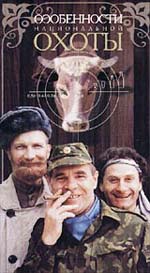Peculiarities of the National Hunt
| Peculiarities of the National Hunt | |
|---|---|

VHS cover
|
|
| Directed by | Aleksandr Rogozhkin |
| Produced by | Aleksandr Golutva |
| Written by | Aleksandr Rogozhkin |
| Starring |
Aleksei Buldakov Viktor Bychkov Sergey Gusinsky Semen Strugachev Sergey Russkin Sergey Kupryanov Ville Haapasalo |
| Music by | Vladimir Panchenko |
| Cinematography | Andrei Zhegalov |
| Edited by | Tamara Denisova |
| Distributed by | Lenfilm |
|
Release date
|
|
|
Running time
|
94 minutes |
| Country | Russia |
| Language | Russian, English, Finnish, German |
Peculiarities of the National Hunt (Russian: Особенности национальной охоты, Osobennosti natsionalnoy okhoty) is the first and most notable "Russian national comedy". As soon as it was released in 1995 it became a nationwide success in Russia, the leader at the Russian box office. It won the Nika Award and Kinotavr awards. It was followed by several other "Peculiarities..." films.
A young Finn, Raivo (Ville Haapasalo), studying Russian manners and traditions, convinces his friend Женя [Eugene] (Сергей Куприянов) to help him participate in a real hunt in order to better familiarize himself with its peculiarities. They band together with a company led by an ex-army general (Alexey Buldakov) and set off to a distant cordon in the woods, taking with them several cases of vodka.
Waiting for them at the cordon is an eccentric huntsman, Kuzmich (Viktor Bychkov), who occupies himself with meditation and Japanese culture, and some big-city types from St. Petersburg.
Instead of the expected hunt, Raivo (Райво) finds himself encountering rampant drinking and adventures. The plot can be divided into several vignettes – an incident with a bear in a sauna, the fireworks, the story of the rural policeman who lost his pistol, the scene on the farm, the story about the cow being transported in the weapons bay in a modern bomber (Tupolev Tu-22M) in exchange for a bottle of vodka, the drive in a "borrowed" police car UAZ to get to know some local milkmaids, etc.
In the whirlwind of drinking and good times, the hunt itself takes a secondary or even tertiary position.
The second plot line are the Finn’s daydreams of a real hunt based on his impressions from classic Russian literature. Short episodes from the pre-revolutionary period periodically appear throughout the film as inserts woven into the primary storyline. “Historical” hunting differs greatly form the modern version. The participants of the traditional hunt, unlike their would-be hunter contemporaries, enjoy conversation in French, flirting with women and constant treats without forgetting what’s important – tracking a large wolf.
...
Wikipedia
